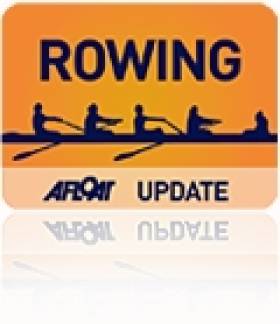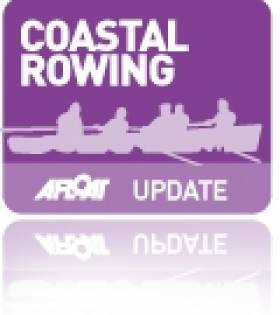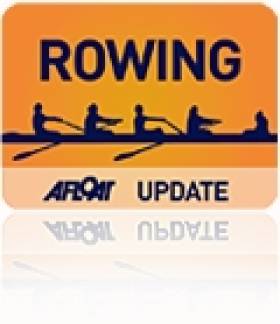Displaying items by tag: Keohane
Rowing Round–up: Puspure Fifth in Belgrade, Keohane Wins in Ghent, Black and Cassells in the Hunt
#ROWING – After an intense weekend of international competition for Irish rowers Sanita Puspure finished fifth in the A Final of the single scull at the World Cup Regatta in Belgrade. Puspure tasted this level of competition in the single scull for the first time. Claire Lambe finished fifth in the A Final of the lightweight single sculls at the World Cup.
John Keohane Won the Men's Single Scull at Ghent Rowing Regatta but he was only one of a collection of Irish winners.
Chris Black and Joel Cassells did themselves no harm in the hunt for selection on the Ireland team for the World Junior Championships when they won their final at Munich Junior Regatta.
All the latest Irish rowing news here
Irish crews had a good first day at the Fisa World Coastal Rowing Championships in Bari in Italy. John Keohane, who is defending his crown in the men’s single, qualified through the heats for tomorrow’s A Final, as did Monika Dukarska and Sheila Clavin in the women’s single. The men’s coxed quadruple from Kilmacsimon saw their hopes disappear in an instant when their bowman broke an oar in their heat. They came home down the field with just three men rowing, but went on to win their C Final last evening.
Fisa World Coastal Rowing Championships, Bari, Italy Day One
Men
Quadruple, coxed – Heat Two (1-8 to A Final; 9-16 to B Final; rest to C Final): 1 Bayer Leverkusen, Germany 20:55.60; 18 Kilmacsimon (S Bennett, S O’Neill, K O’Dwyer, E O’Neill; K O’Leany) 27:56.60. C Final: 1 Kilmacsimon 26:03.50.
Double – Heat Two (1-6 to A Final, 7-12 to B Final; 13-18 to C Final; rest to D Final): 1 Elpis Genova, Italy 21:45.80; 14 Kilmacsimon (D O’Donovan, R Farrissey) 30:48.00. C Final: 6 Kilmacsimon 31:30.70.
Single – Heats (1-8 To A Final; 9-16 to B Final; rest to C Final) – Heat One: 1 Trieste, Italy (S Martini); 11 Arklow (E Kavanagh). Heat Two: 1 Cus Pavia, Italy 24:34.90; 6 Kilmacsimon (J Keohane) 25:24.60.
Women
Double – Heats (1-6 to A Final; rest to B Final) – Heat One: 1 Aviron Hennebont, France 26:23.50; 8 Arklow (D Maghery, Y Jordan) 34:04.30. Heat Two: 1 Aviron Grenoblois, France 26:47.10; 8 Kilmacsimon (H O’Neill, L O’Neill) 38:15.20.
Single – Heats (1-6 to A Final; rest to B Final) – Heat One: 1 Murcarolo, Italy 30:20.60; 3 St Michael’s (S Clavin) 33:12.50, 8 Arklow (J Ni Ghormain) 39:02.00. Heat Two: 1 Societe Nautique D’Avignon 29:19.90, 2 Killorglin (M Dukarska) 30:38.90; 8 Arklow (J Lee) 42.01.80.
Cork Crews Rise to the Top at Cork Head
Cork crews saw off rivals from far and near at the Cork rowing Head of the River at the Marina on Saturday. UCC’s men’s senior eight were the fastest men’s crew – by 1.3 seconds from De Maas of Rotterdam, a masters eight. The fastest women’s crew was Cork Boat Club’s junior 18 eight, adjudged just .8 of a second quicker than UCD’s women’s senior eight. The fastest men’s single sculler was John Keohane of Lee Valley and Karen Corcoran-O’Hare of Shandon was the fastest women’s single sculler.
Cork Head of the River, The Marina, Cork, Saturday
Overall: 1 UCC men’s senior eight 12 minutes 6.7 seconds, 2 De Maas, Rotterdam men’s masters eight 12:08.0, 3 UCC men’s novice eight 12:25.9, 4 UCD men’s novice eight 12:42.4, 5 Presentation College men’s junior eight 12:44.3, 6 Muckross intermediate eight 12:49.9.
Men, Eight – Senior: UCC 12:06.7. Intermediate: Muckross 12:49.9. Novice: UCC 12:25.9. Junior: Presentation 12:44.3. Junior 16: Cork 13:21.2. Masters: De Maas 12:08.0.
Fours – Senior: Cork/Garda 12:53.6. Intermediate: UCC 13:40.6. Novice: Cappoquin 13:43.9. Junior 18, coxed: Presentation 13:04.0
Pair – Junior 18: Presentation 14:58.7. Masters: De Maas 13:09.9. Coastal – Novice: Ahakista 17:28.7.
Sculling, Quadruple – Senior: Shannon 13:50.8. Novice: Shannon 15:07.4. Junior 18: Cork 13:05.3. Junior 16: Cork 13:15.2.
Double – Intermediate: Cork IT 13:41.6. Junior 18: Clonmel 13:53.9. Junior 16: St Michael’s 15:04.4. Coastal – Novice: Kilmacsimon 16:17.2.
Single – Senior: Lee Valley (J Keohane) 14:16.4. Intermediate: Lee (O’Connell) 14:53.4. Novice: Lee (O’Connell) 14:37.9. Junior 18: Workmen’s (Burns) 14:33.0. Junior 16: Shandon (Casey) 15:08.9. Masters: Skibbereen (Barry) 15:40.07. Coastal – Novice: Kilmacsimon 17:33.6
Women – Overall: 1 Cork junior eight 13:40.0, 2 UCD senior eight 13:40.8, 3 St Michael’s junior eight 13:54.1.
Eight – Senior: UCD 13:40.8. Novice: UCC 14:25.4. Junior 18: 1 Cork 13:40.0. Junior 16: Clonmel 16:21.0.
Four – Senior: Muckross 14:15.9. Intermediate: UCC 17:00.9. Novice: UCC 16:29.8. Masters: Skibbereen 22:34.9.
Pair – Junior 18: St Michael’s 15:00.2.
Sculling, Quadruple - Novice: Shannon 15:51.4. Junior 16: St Michael’s 15:16.5.
Double – Intermediate: UCC 16:15.1. Junior 18: Cork 14:43.9. Junior 16: Lee 15:42.3. Masters: Cork 15:38.3.
Single – Senior: Intermediate: Shandon (K Corcoran-O’Hare) 15:39.7. Junior 18: Lee (Kearney) 16:52.1. Junior 16: Lee (Hamel) 16:13.6. Masters: Cork (Crowley) 17:49.2.
Coastal: 1 Kilmacsimon men’s novice double scull 16:17.2, 2 Ahakista men’s novice quadruple coxed scull 17:28.7.
Click this link for Irish Rowing detailsClick this link for the Latest Rowing News
































































